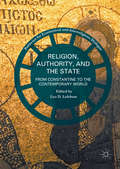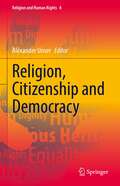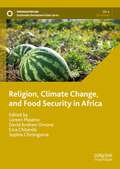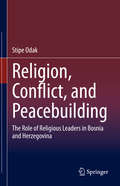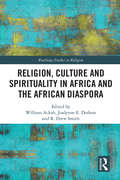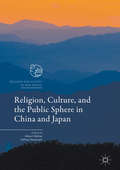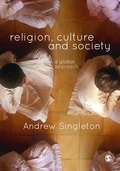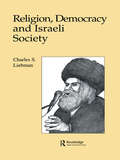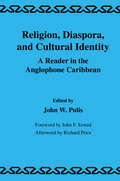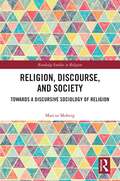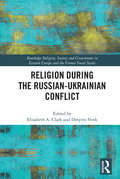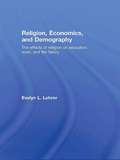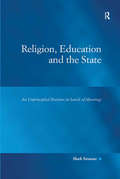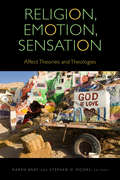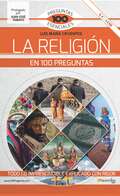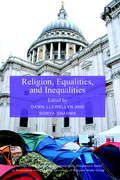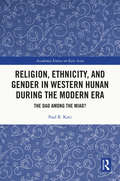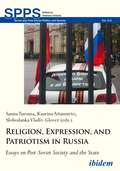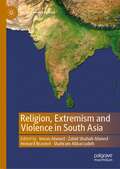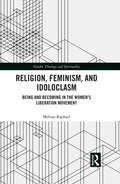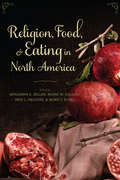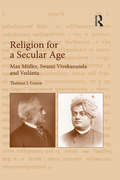- Table View
- List View
Religion, Authority, and the State
by Leo D. LefebureIn commemoration of Constantine's grant of freedom of religion to Christians, this wide-ranging volume examines the ambiguous legacy of this emperor in relation to the present world, discussing the perennial challenges of relations between religions and governments. The authors examine the new global ecumenical movement inspired by Pentecostals, the role of religion in the Irish Easter rebellion against the British, and the relation between religious freedom and government in the United States. Other essays debate the relation of Islam to the violence in Nigeria, the place of the family in church-state relations in the Philippines, the role of confessional identity in the political struggles in the Balkans, and the construction of Slavophile identity in nineteenth-century Russian Orthodox political theology. The volume also investigates the contrast between written constitutions and actual practice in the relations between governments and religions in Australia, Indonesia, and Egypt. The case studies and surveys illuminate both specific contexts and also widespread currents in religion-state relations across the world.
Religion, Citizenship and Democracy (Religion and Human Rights #8)
by Alexander UnserThis innovative volume is focused on the impact of religion on the realization of democratic citizenship. The researchers contributing provide empirical evidence on how religion influences attitudes towards citizenship and democracy in different countries. The book also tackles the challenges and opportunities for citizenship education. Experts contributing from sociology, political science, theology, and educational science look at the impact of religious beliefs and practices on democratic attitudes and behavior. Chapters also concern how religion influences the recognition of others as citizens. The text appeals to graduates and researchers in these fields with a secondary market for the general interest reader.
Religion, Climate Change, and Food Security in Africa (Sustainable Development Goals Series)
by Loreen Maseno David Andrew Omona Ezra Chitando Sophia ChirongomaThis book addresses the relationship between religion, climate change, and food security in Africa. Contributors to this volume interrogate how and to what extent religion in Africa serves as a resource (or confounding factor) in responding to Sustainable Development Goals 13 (action on climate change) and 2 (achieve Zero Hunger, achieve food security and improved nutrition, and promote sustainable agriculture). Approaching the theme from diverse disciplinary and methodological angles, contributors probe the potential role of religion in Africa to accelerate the achievement of these two SDGs, especially the role of religion with regard to food availability, food accessibility, food utilization, and food systems stability.
Religion, Conflict, and Peacebuilding: The Role of Religious Leaders in Bosnia and Herzegovina
by Stipe OdakThis book provides fresh insights into the role of religious leaders in conflict transformation and peacebuilding. Based on a large dataset of interviews with Christian and Muslim leaders in Bosnia and Herzegovina, it offers a contextually rich analysis of the main post-conflict challenges: forgiveness, reconciliation, and tragic memories. Designed as an inductive, qualitative research, it also develops an integrative theoretical model of religiously-inspired engagement in conflict transformation. The work introduces a number of new concepts which are relevant for both theory and practice of peacebuilding, such as Residue of Forgiveness, Degree Zero of Reconciliation, Ecumene of Compassion, and Phantomic Memories. The book, furthermore, proposes two correlated concepts – “theological dissonance” and “pastoral optimization” – as theoretical tools to describe the interplay between moral ideals and practical limitations. The text is a valuable resource for religious and social scholars alike, especially those interested in topics of peace, conflict, and justice. From the methodological standpoint, it is an original and audacious attempt at bringing together theological, philosophical, and political narratives on conflicts and peace through the innovative use of the Grounded Theory approach.
Religion, Culture and Spirituality in Africa and the African Diaspora (Routledge Studies in Religion)
by R. Drew Smith William Ackah Jualynne E. DodsonReligion, Culture and Spirituality in Africa and the African Diaspora explores the ways in which religious ideas and beliefs continue to play a crucial role in the lives of people of African descent. The chapters in this volume use historical and contemporary examples to show how people of African descent develop and engage with spiritual rituals, organizations and practices to make sense of their lives, challenge injustices and creatively express their spiritual imaginings. This book poses and answers the following critical questions: To what extent are ideas of spirituality emanating from Africa and the diaspora still influenced by an African aesthetic? What impact has globalisation had on spiritual and cultural identities of peoples on African descendant peoples? And what is the utility of the practices and social organizations that house African spiritual expression in tackling social, political cultural and economic inequities? The essays in this volume reveal how spirituality weaves and intersects with issues of gender, class, sexuality and race across Africa and the diaspora. It will appeal to researchers and postgraduate students interested in the study of African religions, race and religion, sociology of religion and anthropology.
Religion, Culture, and the Public Sphere in China and Japan
by Albert Welter Jeffrey NewmarkThis collection examines the impact of East Asian religion and culture on the public sphere, defined as an idealized discursive arena that mediates the official and private spheres. Contending that the actors and agents on the fringes of society were instrumental in shaping the public sphere in traditional and modern East Asia, it considers how these outliers contribute to religious, intellectual, and cultural dialog in the public sphere. J#65533;rgen Habermas conceptualized the public sphere as the discursive arena which grew within Western European bourgeoisie society, arguably overlooking topics such as gender, minorities, and non-European civilizations, as well as the extent to which agency in the public sphere is effective in non-Western societies and how practitioners on the outskirts of mainstream society can participate. This volume responds to and builds upon this dialogue by addressing how religious, intellectual, and cultural agency in the public sphere shapes East Asian cultures, particularly the activities of those found on the peripheries of historic and modern societies.
Religion,Culture and the State
by Pierre Anctil Howard AdelmanThe Canadian principle of reasonable accommodation demands that the cultural majority make certain concessions to the needs of minority groups if these concessions will not cause 'undue hardship.' This principle has caused much debate in Quebec, particularly over issues of language, Muslim head coverings, and religious symbols such as the kirpan (traditional Sikh dagger). In 2007, Quebec Premier Jean Charest commissioned historian and sociologist Gérard Bouchard and philosopher and political scientist Charles Taylor to co-chair a commission that would investigate the limits of reasonable accommodation in that province.Religion, Culture, and the State addresses reasonable accommodation from legal, political, and anthropological perspectives. Using the 2008 Bouchard-Taylor Report as their point of departure, the contributors contextualize the English and French Canadian experiences of multiculturalism and diversity through socio-historical analysis, political philosophy, and practical comparisons to other jurisdictions. Timely and engaging, Religion, Culture, and the State is a valuable resource in the discussion of religious pluralism in Canadian society.
Religion, Culture & Society: A Global Approach
by Andrew Singleton"The reader is taken on a global exploration of the forms and diversities of religions and their social and cultural contexts... It is up to the minute in research and theory, and comfortably grounded in the traditions of the social explanation of things religious and spiritual." - Gary Bouma AM, Monash University "Tells how sociology of religion originated in the work of key nineteenth and twentieth century theorists and then brings the story into the present era of globalization, hybrid spirituality, and the Internet. Students of religion will find this an engaging and informative survey of the field." - Robert Wuthnow, Princeton University "It considers the 'big questions' - What is religion? How is religion changing in a modern world? What is the future of religion? - and addresses them through tangible case studies and observations of contemporary life. Its global perspective reflects the breadth, diversity and vibrancy of this field." - Sylvia Collins-Mayo, Kingston University This is a rich and dynamic introduction to the varieties of religious life and the central issues in the sociology of religion today. It leads the reader through the key ideas and main debates within the field as well as offering in-depth descriptions and analysis of topics such as secularization, fundamentalism, Pentecostal Christianity, Buddhism, Hinduism, Islam, atheism, 'The spiritual marketplace', digital religion and new religions like Wicca. Emphasising religion as a global phenomenon, examining especially the ways in which globalization has had an impact on everyday religious life, Singleton has created an illuminating text suitable for students in a wide range of courses looking at religion as a social and cultural phenomenon.
La religión de Jesús: Comentario al Evangelio diario. Ciclo A (2010-2011)
by José Mª Castillo SánchezLa lectura y meditación de los evangelios nos propone siempre un ejemplo a seguir. Pero, ¡atención!, los evangelios nos presentan también un escándalo. Porque en ellos se nos dice que Jesús, por lo que hacía y por lo que decía, fue un hombre escandaloso. Los evangelistas lo afirman repetidas veces y sin titubeos (Mt 11, 6; 17, 27; 26, 31; Mc 14, 27; Jn 6, 61). Y san Pablo lo confirma (1 Cor 1, 23; Gal 5, 11). El Evangelio nos enseña así que en la vida tenemos que ser personas ejemplares. Pero también nos dice que no nos debe dar miedo resultar (quizá) escandalosos. Por eso la lectura y meditación del Evangelio termina siendo una especie de agonía, en el sentido etimológico de esta palabra: ágon = lucha. Porque afrontar la lectura y meditación del Evangelio es afrontar un combate. El combate interior que todos llevamos dentro de nosotros mismos. El combate de nuestra propia humanidad contra la deshumanización que rompe nuestras vidas.
Religion, Democracy and Israeli Society
by Charles S. LiebmanFirst Published in 1997. The essays in this volume are revisions, in some cases substantial, to the 1995 Sherman Lectures which the author delivered at SOAS, the School of Oriental and African Studies of the University of London.
Religion, Diaspora and Cultural Identity: A Reader in the Anglophone Caribbean (Library Of Anthropology. Ser. #Vol. 14.)
by J.W. PulisAlthough the religions of the Caribbean have been a subject of popular media, there have been few ethnographic publications. This text is a much-needed and long overdue addition to Caribbean studies and the exploration of ideas, beliefs, and religious practices of Caribbean folk in diaspora and at home. Drawing upon ethnographic and historical research in a variety of contexts and settings, the contributors to this volume explore the relationship between religious and social life. Whether practiced at home or abroad, the contributors contend that the religions of Caribbean folk are dynamic and creative endeavors that have mediated the ongoing and open-ended relation between local and global, historical and contemporary change.
Religion, Discourse, and Society: Discourse Theory and Analysis for the Sociology of Religion (Routledge Studies in Religion)
by Marcus MobergThis book focuses on the utility and application of discourse theory and discourse analysis in the sociological study of religious change. It presents an outline of what a ‘discursive sociology of religion’ looks like and brings scholarly attention to the role of language and discourse as a significant component in contemporary processes of religious change. Marcus Moberg addresses the concept of discourse and its main meta-theoretical underpinnings and discusses the relationship between discourse and ‘religion’ in light of previous research. The chapters explore key notions such as secularism and public religion as well as the ideational and discursive impact of individualism and market society on the contemporary Western religious field. In addition to providing scholars with a thorough understanding and appreciation of the analytic utility of discourse theory and analysis in the sociological study of religious change, the book offers a cohesive and systematized framework for actual empirical analysis.
Religion During the Russian Ukrainian Conflict (Routledge Religion, Society and Government in Eastern Europe and the Former Soviet States)
by Elizabeth A. Clark; Dmytro VovkThis book investigates how the military conflict between Russia and Ukraine has affected the religious situation in these countries. It considers threats to and violations of religious freedom, including those arising in annexed Crimea and in the eastern part of Ukraine, where fighting between Ukrainian government forces and separatist paramilitary groups backed and controlled by Russia is still going on, as well as in Russia and Ukraine more generally. It also assesses the impact of the conflict on church-state relations and national religion policy in each country and explores the role religion has played in the military conflict and the ideology surrounding it, focusing especially on the role of the Ukrainian and Russian Orthodox churches, as well as on the consequences for inter-church relations and dialogue.
Religion, Economics and Demography: The Effects of Religion on Education, Work, and the Family (Routledge Frontiers of Political Economy)
by Evelyn LehrerUsing the tools of economics, this book analyses how religion affects decisions and outcomes in a wide range of areas, including education, employment, family size, entry into cohabitation and formal marriage, the choice of spouse and divorce. In each case, the relationships are rigorously quantified based on multivariate statistical analyses of large scale US data. The results show, for example, that when people marry outside their faith, there is an increase in the probability of divorce, the magnitude of the adverse effect depending in part on the ecumenical/exclusivist nature of the two religions. Other analyses show that youth who grow up with some religion in their lives are less likely than their counterparts with little or no religious involvement to drop out of high school or enter cohabiting arrangements at a young age. Overall, both religious affiliation and the extent of participation in religious activities are found to have far-reaching implications for economic and demographic behaviour. The book contains a wealth of data illustrating how the religious and secular realms of people’s lives are intimately intertwined. With its economic perspective, it offers new ways of thinking about these relationships and is a valuable resource for students and scholars interested in the role of religion in education, work and the family.
Religion, Education and the State: An Unprincipled Doctrine in Search of Moorings (Law, Justice And Power Ser.)
by Mark StrasserIn the context of education, Church and State issues are of growing importance and appear to be increasingly divisive. This volume critically examines the developing jurisprudence relating to religion in the schools beginning with Everson v. Board of Education, where the US Supreme Court discussed the wall of separation between Church and State. The study traces both how the Court's views have evolved during this period and how, through recharacterizations of past opinions and the facts underlying them, the Court has appeared to interpret Establishment Clause guarantees in light of the past jurisprudence when in reality that jurisprudence has been turned on its head. The Court not only offers an unstable jurisprudence that is more likely to promote than avoid the problems that the Establishment Clause was designed to prevent, but approaches Establishment Clause issues in a way that decreases the likelihood that an acceptable compromise on these important issues can be reached. The study focuses on the situation in the US but the important issue of religion, education and the state has great relevance in many jurisdictions.
Religion, Emotion, Sensation: Affect Theories and Theologies (Transdisciplinary Theological Colloquia)
by Mathew Arthur Karen Bray Amy Hollywood Wonhee Anne Joh Dong Sung Kim Stephen D. Moore A. Paige Rawson Erin Runions Donovan O. Schaefer Gregory J. Seigworth Max Thornton Alexis G. WallerReligion, Emotion, Sensation asks what affect theory has to say about God or gods, religion or religions, scriptures, theologies, and liturgies. Contributors explore the crossings and crisscrossings between affect theory and theology and the study of religion more broadly, as well as the political and social import of such work.Bringing together affect theorists, theologians, biblical scholars, and scholars of religion, this volume enacts creative transdisciplinary interventions in the study of affect and religion through exploring such topics as biblical literature, Christology, animism, Rastafarianism, the women’s Mosque Movement, the unending Korean War, the Sewol ferry disaster, trans and gender queer identities, YA fiction, queer historiography, the prison industrial complex, debt and neoliberalism, and death and poetry.Contributors: Mathew Arthur, Amy Hollywood, Wonhee Anne Joh, Dong Sung Kim, A. Paige Rawson, Erin Runions, Donovan O. Schaefer, Gregory J. Seigworth, Max Thornton, Alexis G. Waller
La religión en 100 preguntas (100 preguntas Esenciales)
by Luis María Cifuentes PérezLas respuestas de la ciencia (Filosofía, Antropología, Teología, Política, Psicología) a los grandes interrogantes que el Homo sapiens se ha planteado sobre lo sobrenatural, lo divino y lo misterioso desde la prehistoria de la Humanidad. Desde las reflexiones más generales como fenómeno cultural hasta el misticismo, la teología, su instrumentación política y la pluralidad de actitudes ante lo religioso. ¿Seremos como dioses algún día?, ¿Por qué la moral familiar es tan importante para las religiones?, ¿Es posible comprender la figura de Jesucristo como Hombre-Dios?, ¿Es el Islam una religión de amor y de paz?, ¿Por qué el judaísmo es una religión profética?
Religion, Equalities, and Inequalities (Theology and Religion in Interdisciplinary Perspective Series in Association with the BSA Sociology of Religion Study Group)
by Dawn Llewellyn Sonya SharmaPresenting cutting edge research on how religion can confront and obscure social inequalities in everyday life, Religion, Equalities and Inequalities argues that when religion is left out of social scientific analyses, it can result in incomplete analyses that conceal pathways to social inclusion and exclusion. Bringing together an international and interdisciplinary group of contributors who operate at the vanguard of theoretical and empirical work on how social structures of power, institutions and bodies can generate equalities and inequalities in religion, the collection shows how religion can enable and challenge the inequities that affect people’s everyday lives. Academics and students of religious studies, sociology, politics and social policy will all find this book offers useful insights into the relationship between religion and contemporary culture.
Religion, Ethnicity, and Gender in Western Hunan during the Modern Era: The Dao among the Miao? (Academia Sinica on East Asia)
by Paul R. KatzThis book explores how beliefs and practices have shaped the interactions between different ethnic groups in Western Hunan, as well as considering how religious life has adapted to the challenges of modern Chinese history. Combining historical and ethnographic methodologies, chapters in this book are structured around changes that occurred during the interaction between Miao ritual traditions and religions such as Daoism, with particular focus on the commonalities and differences seen between Western Hunan and other areas of Southwest China. In addition, investigation is made into how gender and ethnicity have shaped such processes, and what these phenomena can teach about larger questions of modern Chinese history. As such, this study transcends existing scholarship on Western Hunan – which has stressed the impact of state policies and elite agendas – by focusing instead on the roles played by ritual specialists. Such findings call into question conventional wisdom about the ‘standardization’ of Chinese culture, as well as the integration of local society into the state by means of written texts. Religion, Ethnicity, and Gender in Western Hunan during the Modern Era will prove valuable to students and scholars of history, ethnography, anthropology, ethnic studies, and Asian studies more broadly.
Religion, Expression, and Patriotism in Russia: Essays on Post-Soviet Society and the State (Soviet and Post-Soviet Politics and Society #213)
by Sanna TuromaThe 2010s saw an introduction of legislative acts about religion, sexuality, and culture in Russia, which caused an uproar of protests. They politicized areas of life commonly perceived as private and expected to be free of the state's control. As a result, political activism and radical grassroots movements engaged many Russians in controversies about religion and culture and polarized popular opinion in the capitals and regions alike. This volume presents seven case studies that probe into the politics of religion and culture in today's Russia. The contributions highlight the diversity of Russia's religious communities and cultural practices by analyzing Hasidic Jewish identities, popular culture sponsored by the Orthodox Church, literary mobilization of the National Bolshevik Party, cinematic narratives of the Chechen wars, militarization of political Orthodoxy, and moral debates caused by opera as well as film productions. The authors draw on a variety of theoretical approaches and methodologies, including opinion surveys, ethnological fieldwork, narrative analysis, Foucault's conceptualization of biopower, catachrestic politics, and sociological theories of desecularization. The volume’s contributors are Sanna Turoma, Kaarina Aitamurto, Tomi Huttunen, Susan Ikonen, Boris Knorre, Irina Kotkina, Jussi Lassila, Andrey Makarychev, Elena Ostrovskaya, and Mikhail Suslov.
Religion, Extremism and Violence in South Asia (Politics of South Asia)
by Imran Ahmed Shahram Akbarzadeh Howard Brasted Zahid Shahab AhmedThis book sheds light on religiously motivated extremism and violence in South Asia, a phenomenon which ostensibly poses critical and unique challenges to the peace, security and governance not only of the region, but also of the world at large. The book is distinctive in-so-far as it reexamines conventional wisdom held about religious extremism in South Asia and departs from the literature which centres its analyses on Islamic militancy based on the questions and assumptions of the West’s ‘war on terror’. This volume also offers a comprehensive analysis of new extremist movements and how their emergence and success places existing theoretical frameworks in the study of religious extremism into question. It further examines topical issues including the study of social media and its impact on the evolution and operation of violent extremism. The book also analyses grassroots and innovative non-state initiatives aimed to counter extremist ideologies. Through case studies focusing on Bangladesh, India, Pakistan and Sri Lanka, this collection examines extremist materials, methods of political mobilisation and recruitment processes and maps the interconnected nature of sociological change with the ideological transformations of extremist movements.
Religion, Feminism, and Idoloclasm: Being and Becoming in the Women's Liberation Movement (Gender, Theology and Spirituality)
by Melissa RaphaelReligion, Feminism, and Idoloclasm identifies religious and secular feminism’s common critical moment as that of idol-breaking. It reads the women’s liberation movement as founded upon a philosophically and emotionally risky attempt to liberate women’s consciousness from a three-fold cognitive captivity to the self-idolizing god called ‘Man’; the ‘God’ who is a projection of his power, and the idol of the feminine called ‘Woman’ that the god-called-God created for ‘Man’. Examining a period of feminist theory, theology, and culture from about 1965 to 2010, this book shows that secular, as well as Christian, Jewish, and post-Christian feminists drew on ancient and modern tropes of redemption from slavery to idols or false ideas as a means of overcoming the alienation of women’s being from their own becoming. With an understanding of feminist theology as a pivotal contribution to the feminist criticism of culture, this original book also examines idoloclasm in feminist visual art, literature, direct action, and theory, not least that of the sexual politics of romantic love, the diet and beauty industry, sex robots, and other phenomena whose idolization of women reduces them to figures of the feminine same, experienced as a de-realization or death of the self. This book demonstrates that secular and religious feminist critical engagements with the modern trauma of dehumanization were far more closely related than is often supposed. As such, it will be vital reading for scholars in theology, religious studies, gender studies, visual studies, and philosophy.
Religion, Food, and Eating in North America (Arts and Traditions of the Table: Perspectives on Culinary History)
by Benjamin E. Zeller Marie W. Dallam Reid L. Neilson Nora L. RubelThe way in which religious people eat reflects not only their understanding of food and religious practice but also their conception of society and their place within it. This anthology considers theological foodways, identity foodways, negotiated foodways, and activist foodways in the United States, Canada, and the Caribbean. Original essays explore the role of food and eating in defining theologies and belief structures, creating personal and collective identities, establishing and challenging boundaries and borders, and helping to negotiate issues of community, religion, race, and nationality.Contributors consider food practices and beliefs among Christians, Jews, Muslims, and Buddhists, as well as members of new religious movements, Afro-Caribbean religions, interfaith families, and individuals who consider food itself a religion. They traverse a range of geographic regions, from the Southern Appalachian Mountains to North America's urban centers, and span historical periods from the colonial era to the present. These essays contain a variety of methodological and theoretical perspectives, emphasizing the embeddedness of food and eating practices within specific religions and the embeddedness of religion within society and culture. The volume makes an excellent resource for scholars hoping to add greater depth to their research and for instructors seeking a thematically rich, vivid, and relevant tool for the classroom.
Religion, Food, and Eating in North America
by Benjamin E. Zeller Reid L. Neilson Nora L. Rubel Martha L. Finch Marie W. DallamThe way in which religious people eat reflects not only their understanding of food and religious practice but also their conception of society and their place within it. This anthology considers theological foodways, identity foodways, negotiated foodways, and activist foodways in the United States, Canada, and the Caribbean. Original essays explore the role of food and eating in defining theologies and belief structures, creating personal and collective identities, establishing and challenging boundaries and borders, and helping to negotiate issues of community, religion, race, and nationality. Contributors consider food practices and beliefs among Christians, Jews, Muslims, and Buddhists, as well as members of new religious movements, Afro-Carribean religions, interfaith families, and individuals who consider food itself a religion. They traverse a range of geographic regions, from the Southern Appalachian Mountains to North America's urban centers, and span historical periods from the colonial era to the present. These essays contain a variety of methodological and theoretical perspectives, emphasizing the embeddedness of food and eating practices within specific religions and the embeddedness of religion within society and culture. The volume makes an excellent resource for scholars hoping to add greater depth to their research and for instructors seeking a thematically rich, vivid, and relevant tool for the classroom.
Religion for a Secular Age: Max Müller, Swami Vivekananda and Vedānta
by Thomas J. GreenReligion for a Secular Age provides a transnational history of modern Vedānta through a comparative study of two of its most important exponents, Friedrich Max Muller (1823–1900) and Swami Vivekananda (1863–1902). This book explains why Vedānta's appeal spanned the ostensibly very different contexts of colonial India and Victorian Britain and America, and how this ancient form of thought was translated by Muller and Vivekananda into a modern form of philosophy or religion. These religiously-committed men attempted to reconcile religion with modernity by appealing to Advaita (literally, 'non-dualistic') Vedānta's monistic interpretation of reality. The 'scientific' study of religion allegedly demonstrated the evolutionary superiority of Vedānta and the possibility of religion's survival in 'the light of modern science'. They believed Vedānta could also provide the religious basis for moral engagement in this world, even as the hold of orthodox Christianity and traditional Hinduism appeared to be weakening. Vedānta thus served as a way of articulating a form of religion suitable for a secular age – religion which has embraced modern forms of thought while breaking away from creeds, scriptures and institutions to thrive in the spheres of public debate of London, Calcutta and New York.
